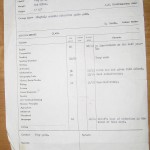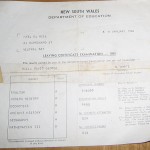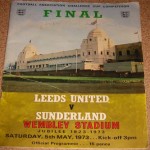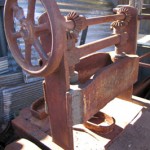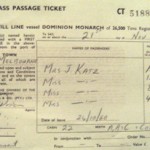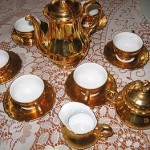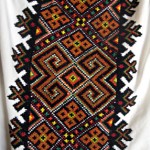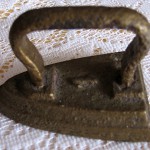Scottish-English
Eastbourne, Sussex, England
Tilbury Docks, London, England in April 1959
Sydney in June 1959
Fairbridge Farm School village & farm, Molong, NSW (child migrant scheme near Orange) for 3 years
I shared a bedsit with my mum in North Sydney.
Fairbridge Farm agricultural/domestic trainee
Hardware shop assistant (Crows Nest); sandwich cutter in Sydney CBD; labourer on building sites; refuse collector and gardener (Mosman Council); selling tennis coaching courses; barman, food & drinks waiter, pub bouncer (Neutral Bay); delivery agent for Grace Bros; tutor at Sydney University; journalist; investment banker; accountant; Director, Ministerial Advisory Unit, NSW Government; Commissioner, State Rail Authority of NSW; Chair & Managing Director, Australian Broadcasting Corporation; President, North Sydney Bears rugby league club; Chair, Soccer Australia; Chair, Sydney Water Corporation; author.
I was born in 1946 in post-war England, in the south. Everybody around us was poor. My mum – when my twin brother and I were born – already had two children and no husband, so she had four children under 10 years of age to care for.
Mum was apparently taken in by the local vicar in Eastbourne, an old holiday resort town, to have [us]. She had been a domestic servant but with two children and pregnant with twins, she had to leave, so we were born into poverty.
Mum was from Scotland. She’s illegitimate and was brought up by her grandmother who died when my mum was 14. There was nowhere for her to go so she went into the big houses in the south of England. At 17, she was pregnant with my [eldest] brother Tony and married and her husband later shot through. She had another son that died of meningitis when only months old. Dudley’s father was a Canadian who disappeared in the Second World War and she never saw him again. And then we were illegitimate, Richard and I, and she was abandoned.
I’ve never met my natural father. There was such a stigma in those days with divorce and single parenting. We were brought up to say that Mum was widowed. There were a lot of widows from the war, mind you, [but] we knew it didn’t ring true and frankly so did all the people in the village, but it allowed the preservation of dignity.
There was chronic housing shortage after the Second World War. We lived in a slum area [that] had a bad reputation for crime. Everything was delivered on a horse and cart and they still had gas street lamps. A guy used to come in the evenings and light the gas and come back and fluff it out.
The setting of the old Coronation Street [TV series] captured our environment fairly well. We spent the first few years in three rooms, this tiny little upstairs of a terrace house that didn’t have a kitchen or a bathroom. We used to carry our potties to the common toilet out the back.
Tony took on fatherly responsibilities from an extraordinarily young age. He was still at school and got a job in a local fish shop at weekends. We had no extended family so whenever Mum was ill or something went wrong, we were put into care. When we were six, Mum put my twin and I in Dr Barnardos – the giant children’s home in Barkingside in Essex. There were about 2,000 kids there. It was huge.
I can only remember it as traumatic. The idea of nurturing and care and affection and love just didn’t enter the equation back in those days. I can remember Mum gave us some coloured writing paper so we could write to her. I remember the other kids stealing our paper, humiliating us, tearing it up and running away. It was only much later I realised a lot of this cruelty was that most of them didn’t have anybody to write to.
Mum got a job next to Eastbourne station in the railway workers’ café so railways were in my blood if you like! She managed to get from welfare the old servants’ quarters in the basement of an old Victorian terrace we shared with lots of other families.
“We had dressed up for this photo. It was taken by my eldest brother Tony with the family's first Box Brownie camera. It was a few months after my twin Richard and I had left the Barnados home and were reunited with Mum and our brothers.”
We were there for a couple of years while that magnificent Clement Atlee welfare state government are building a big, new housing estate on land towards Hastings resumed from an old aristocratic family. [The government] was trying, for the first time in British history, to give everybody essential food, shelter, clothing, education and health. I think it’s the most remarkable social experiment [although] it’s much maligned now.
I can still remember Bourne Junior Primary School. There is nothing new about this and it still goes on today. Most kids from where I came from [are] unlikely to have had a decent education and most of them are still paying for it. Just looking at these [school reports] when I was 7 or 8 – I did poorly – and when I got to Australia they got worse.
“I can still remember Bourne Junior Primary School. For the school photo, we were told to do up our shirt buttons, comb hair, but somehow my tie got lost. I was about six or seven.”
I was good at sport. In fact all those reports say I was boisterous. I didn’t like the classroom at all, I had no connection with it, and I loved football. When I finally got to Sydney, I simply I did what the Romans do and ended up playing very good rugby league. It was only later in life that I went back and played old men’s soccer.
Manchester United! We never had big presents but Mum somehow managed to put food on the table and there would always be a birthday present. I remember for my tenth birthday I got a red t-shirt with a white collar and bands which was then the Manchester [kit].
“When I lived in England in the 1970s I would watch George Best, who was one of the most beautiful footballers I ever saw. I ended up being invited, as a result of high profile jobs I had later in Australia, to "celebrity" charity soccer matches. I was supposed to be marking George Best but he scored three goals. I didn't even see him move. It was a thrill to be out there on the field with such genius.”
We moved to the new welfare housing estate at Langley. Over half the village were people from the slums and the bombed out East End of London. These were tiny little houses, brilliantly designed. They had a centrally-located chimney which provided heating and hot water. It was so exciting because for the first time we lived in a house with a bathroom and inside toilet.
Miraculously, Mum still managed to put food on the table. By that stage, the gap was starting to show. If we went to a birthday party, we couldn’t even buy a card, so we were starting to be aware of it.
What led us to come to Australia? Mum was always aspirational about her kids but there was no way she could keep us beyond the minimum school leaving age. The prospects were looking we were just going to perpetuate the generational cycles of poverty.
Australia was selling itself in a big way as the land of golden opportunity and sunshine. That was the slogan they used in the 1950s. I remember there was a woman [whose] boys went to Tasmania. One of them became a policeman. Where we came from, that was enormous social progress. Mum thought, “Wow!”
There was another factor too. By the late ’50s, Britain was in a lot of trouble spots around the world. Mum’s [own] family had been disrupted by the Second World War [and] her parents separated in the First. They still had conscription in England.
A woman Mum worked with was looking into the Fairbridge Farm School scheme. Fairbridge promised the kids to come to Australia and would pay for education. As soon as Mum expressed interest, they were visiting with these wonderful brochures. She signed us over on the understanding she was going to follow us out under the new ‘One Parent Scheme’. [It] was an act not of irresponsibility but as a sacrifice. We were going to complete our education at Fairbridge and then we would get back together as a family.
I didn’t know this at the time, [but] Fairbridge were desperate for kids. There was increasing scrutiny and criticism of child migration [and its] inherent flaws. We were different from most child migrants. Their parents had signed over guardianship and lost their children.
It happened pretty quickly. Within months we were on the ship. I was now 12. My twin was 12 and Dudley was 14. The day before we left I went around the village to say goodbye. I remember an old Irish Catholic lady. She gave me a St Christopher [medal] to give me a safe journey and cried. My mates were all at school so I never got to say goodbye.
That was the first time I had to say goodbye to people I knew and loved knowing that I would probably never see them again. That was hard.
We got the bus [and] were taken to a grand old house in Kent. We had never seen such luxury as John Howard Mitchell House in Knockholt.
We were there three weeks. In our group [were] 11 children. They took us to London and completely outfitted us like little Lord Fauntleroy. Mum and Tony came to visit us a couple of times but it was heartbreak stuff.
Later they take us to Tilbury Docks [near London] and here’s the SS Strathaird with eight decks. Can you imagine? We’ve never seen anything so big and grand. It’s very sad too – we are leaving old England forever.
We were seven boys and four girls. The youngest stayed in the girls’ cabin. He was only about six [and] committed suicide later. The [other boys] were in six bunks in a State cabin on D deck which was on the deck. We had our own ensuite bathroom too.
P&O hadn’t adjusted to the change in clientele so we were treated like royalty. It was close to five o’clock and they said, “If you hurry up, you will get the last of tea”. We were horrified at this because we were brought up in the working class tradition of breakfast, dinner and tea. We weren’t impressed [by] bread, marmite and jam so we pig out thinking we’ve got to be camels and store all this to get through tomorrow morning [and] went back to our cabin.
Then eight o’clock, a bell rang, and we were told it was dinner. Dinner? It was an eight course silver service [meal] and the waiters were all Goan, in these starch white suits and they’d proudly served for generations as waiters on the line.
We had a steward that used to wake us in the morning and wash our clothes and iron them. He’d wake you with a cup of tea in bed and say, “Breakfast will be in three-quarters of an hour” [and] would be stirring your tea for you! We would sit in the lounge and for first time in my life [had] drinks with ice and a straw.
The only time we’d ever eaten out, we would go in the cafe behind the cinema in Eastbourne on special occasions for egg and chips [and] Mum [would] teach us how to hold a knife and fork in public.
We went across to Cuxhaven in Germany to pick up about 600 migrants. Only a third of our passengers were British and we reminded them who won the war!
We wrote [at] every port. This is the first [correspondence] we sent, a postcard of the SS Strathaird, this magnificent, old liner. We posted it on the ship but it was sent from Cuxhaven so it’s got an English stamp but a German postmark. It’s to Mum and Tony. Mum died about 20 years ago and she kept a lot of mementos. We, the brothers, inherited her special documents and this was one of them. My twin brother has written:
This is our ship ain’t she a beut. We wont say much as you will or have recieved a letter. just think you will have it soon. Well so long
“Love Rich,” he signed himself, “Dudley”, my older brother and “David”, me. We missed [Mum and Tony] like buggery.
Of course you are sad about leaving, but countering that is this absolute luxury, the fact I had two brothers, the fact I was 12. The ship had reading rooms, libraries, cinemas, swimming pools, play areas. The adventure of discovering this ship was fabulous. They had new menus with still life watercolour designs printed for every dinner, every day.
We sailed through the Bay of Biscay and into the Mediterranean, through the Straits of Gibraltar. I can remember being woken up early by my brother when we went past Gibraltar. Being kids of the Empire, we knew [it] was the gateway to the Mediterranean and British influence in Egypt and India.
The first port we stopped at was Port Said at Egypt. I remember looking out the portholes in the Suez Canal and seeing camels and palm trees and pyramids. Everywhere we stopped, because we were the kids from ‘the orphanage’ – even though none of us were orphans – we were looked after by P&O representatives [which] was a huge status. We stopped at Aden, probably two dozen servants looking after us; elephants in the main street of Colombo [in Sri Lanka] – it was just terrific.
Tony, when I was about eight, taught me how to play chess. In the lounge we’d play with young German migrants coming out here to work as labourers. I registered at the time they were puzzled. What are the British doing sending out their children without parents to Australia for?
Every afternoon they would have a quartet, in tails, playing classical music requests. Of course all the English migrants are working class and have never seen a violin before. All the requests were made by the Germans, even though they were working class [too].
One of the [Fairbridge escorts] was a New Zealand nurse and the other was an Australian schoolteacher. They started off being very proper, but as the trip went on, they obviously met [men and were] having a good time. As they were off enjoying the good life, nobody was making sure we went to bed, making sure we washed. We became feral in the end. There was no schedule, total undiscipline.
We left in April and got here in June. The first thud of reality was coming into the cooler climate and the officers changed out of their white uniforms and into blue. Then to arrive in Australia, the land of golden opportunity and sunshine, [yet] it’s bloody cold and raining.
When I got to Australia, I rolled off the ship. Nobody was fat at Fairbridge but I was so overweight they called me ‘Faddy ‘ill’ [which] many of the Fairbridge kids still call me decades later!!
We stopped at Fremantle, Adelaide, Melbourne and then Sydney. We were taken in those earlier ports to a zoo by one of the local charity groups and fed. I remember getting sick in Melbourne because we had bacon and egg pie and it was lovely and I ate too much of it.
We got to Sydney in the early hours of the morning and Woods, the principal of Fairbridge, was waiting for us and whack – thud of reality – we went for medicals, then he took us to the zoo. Instead of getting the bus up and walking down, he walked us up to get us exhausted. We walked down again, got the ferry back to Circular Quay, then walked to Central [station].
The old Forbes mail [train] did not leave until nine at night, so we had dinner in the railway refreshment room. Again, the railway connection! I remember my first cooked meal in Australia was baked beans on toast. I was so bloody hungry I was very happy to have [it] and there were times on the boat I would have been happy [for] baked beans on toast. You know, these very exotic French menus!
Those mail trains [had] bench seats so you could lie down and get a bit of sleep. It was very cold and they used to have foot warmers. They were lukewarm at Penrith [in western Sydney] and ice blocks at Lithgow. We got to Molong [in central-west NSW] before six o’clock in the morning.
That’s when we were frightened. Apprehensive. Anxious. Fear of what is going to happen now. It’s still dark and we got off this freezing, cold train. Woods was cranky – his wife was late – and we are terrified. We are just making out our surroundings in the pre-dawn light, this desolate [place]. My brother Dudley and Paddy, they were the two oldest boys, were whispering. I overheard them plotting our escape. The truck comes [and] we are going in the darkness, the wind is flapping the canvas. It’s very noisy and bloody cold. Nobody was talking but these anxious glances. Where are we off to now?
We got to Fairbridge and the child migrant farm school. We were ushered into the kitchen of the Principal’s house and there was this big saucepan full of hot cocoa and, God, that was welcome but we were all frightened. What we didn’t know is the first bell. [It] rang for the kids, the village was stirring. All the kids were out in the dark working but we didn’t know that.
One by one our little group is being split, in darkness. You can imagine the insecurity. There is only me and my brothers left now [and] Woods was getting angrier and angrier that nobody from our cottage had come to get us. It turns out that the cottage mother and her husband were on holiday and so Woods gets this huge cane and instructs us to go with him to Canonbar Cottage.
We go in the back door and into the locker room. There’s all this dirty clothing hanging out of lockers and on the floor. Woods doesn’t turn the light on and he’s going around beating these kids up with a stick in the bed and we hear all these screams. They come out rubbing where they’ve been beaten, and Woods storms after them, demanding they get a shower and go to work. The showers are freezing. Oh, [the boys] look so awful because kids cut each other’s hair and they had ill-fitting and unmatching pyjamas. That was our introduction to Fairbridge.
We were issued with tough denim outfits, second-hand stuff. Nobody ever saw their wardrobe again. The speculation is that the bursar was selling everything on the side. We weren’t sent to school and I spent the first day on a horse and cart collecting chicken manure for the vegetable garden.
That first night, the cottage mother was [still] away. I remember the meal was cooked by the boys and it probably was toast. There was one small fire in this very large cottage. After dinner, you sat in these straight-backed chairs and took them around the fire but it was very crowded. Fifteen kids in a cottage that had no lounge furniture, no lounge room. No floor coverings, it was just bare boards. The kids were really rough and not that sympathetic to the newcomers, even though they had gone through this themselves.
I remember going to bed before the others because there was nothing else to do and feeling desperately unhappy. I had two strangers either side of me. My brothers were in beds down the dormitory. And I remember, I surprised myself, I just cried myself to sleep. I missed my mum and this was a very strange and rough, unwelcoming environment.
The following day we were sent to school. But the next morning, I was assigned to work. We were all in a bit of a state of shock. There was no induction and nobody told you what to do. You fell in with the other boys.
A bell dictated life at Fairbridge. The bell, which was a piece of old railway line, was hanging from a trestle and they used to belt it with an iron bar. It used to ring all over the district, you could hear it from miles away. It rang to wake you up. You were supposed to have a cold shower, then your assigned work for the best part of an hour. Then you came back on another bell, telling you to make your bed and get ready for breakfast. Fifteen minutes after, another bell rang, which was to get over to the big Nuffield Hall for breakfast. And this bell rang all day to tell you what the next step of your process was. After school, you were assigned to work again, as you were also on Saturday mornings. Saturday afternoons was organised sport. Sunday afternoons [was] free time.
Typically, I chopped firewood up on the woodheap, sometimes in pre-dawn light, for Lilac Cottage, which was one of the girls’ cottages. I [also] used to help hang out the laundry. Another job I had was making the sandwiches for the schoolkids with bread baked by other boys.
Virtually all of us were forced to leave school at the minimum leaving age of 15 or earlier to work on the farm. They called it “traineeship”. You’ve got this village on a farm with about 200 people, most of them kids. Only five adult farm supervisors. The food was pretty basic but it was largely produced by the children. We grew just about our own fruit and vegetables. We had a big dairy and milked the cows. Had a piggery. We killed sheep twice a week. Our meat diet was largely mutton.
In school holidays, you worked from the age of 13. I didn’t mind working on the vegetable garden because the village gardener was a wonderful human being. Kurt Boelter was German and his wife was our cottage mother. They’d come out to Australia to teach [and] were both university graduates [which was] very unusual because they never attracted good, qualified staff to Fairbridge. It was too remote, underpaid, socially isolated. Most of the staff should never have been near children. Embittered old widows with nowhere else to go tended to be the dominant breed. The one that everybody speaks very badly of was the guy who was one of the longest-serving there, about 20 years, who was an absolute bloody sadist, who beat every kid up just for the hell of it. He ran the dairy.
From about 14½, you were expected to go onto dairy. It was tough work which, frankly, breached all the prevailing labour laws. I never thought I would survive my stint on dairy. You work for 28 days straight before rotating to other work. Dairy, you had to work seven days a week, and we milked the biggest herd in the central-west of NSW at the time.
You had to get up at two-thirty in the morning [to] milk at three. You’d get down for a very late breakfast, then you had to work all morning. You had to milk again by three in the afternoon, and you might finish at six or seven at night.
I’m not typical of the child migrants. The typical Fairbridge kid was only eight years of age, spent the rest of their childhood there and never saw their parents again. We had a mum who followed us out. I was extremely fortunate by comparison. My brothers [were] collective physical security because it was a pretty tough place. The little kids were called runts and there was a savage pecking order. It’s what we would today call bullying. When you belted one Hill boy, you had to be prepared to take on all three.
None of us matriculated even though we were regarded as the brightest [and] were sent to the better high school in Orange, about 35 kilometres away. In 1961, I was thrown out of Orange High as being ‘uneducable’ and sent back to the local Molong school. I think the biggest single failing of Fairbridge is the education we were promised, we never got. Our education standards plummeted. They were aware of it. I’ve seen the records. That was negligent. It was also dishonest. They knew they were failing the children.
Many of the teachers didn’t want us in the classrooms. We were anti-social, anti-education, didn’t want to be there. The town’s kids in the secondary school didn’t want us. [Their parents] saw us as second-class citizens, as a bad influence on their kids and we probably were. Yet we were all obliged to do a vocational guidance test. My report says:
Your aptitude test results disclosed superior to very superior reasoning abilities … more advanced training at university level are considered to be within your capacities. … Provided your school work improves, professional occupations … could be considered.
Not just me, but virtually all the child migrants would have been in the same category. They IQ tested everybody in England and didn’t want anybody with an IQ under 90. Undeniable basic intelligence, capability and aptitude, yet terrible education results.
The board of Fairbridge concluded we were “educationally retarded”. We now understand that kids need nurturing and support and individual focus. And none of that existed at Fairbridge.
Mum was horrified [when] she came to visit us at Fairbridge in 1959. The staff ate a sumptuous English breakfast every day, a variety of different cereals and eggs and bacon and so on, but the kids just had this porridge, bread and milk, eating out of metal bowls and plates.
She would have seen us parade in the hall, most[ly] barefoot, we had terrible old clothing. I remember her mumbling, “It’s Oliver Twist”. She was so distressed. “What have I done? What have I done?” We had to reassure her that it was alright.
She worked as the shearer’s cook on a nearby property and was also a nursing aide in Orange. She finally came to Sydney and got a job. I left Fairbridge earlier than I should have when I was 15½ because I had Mum to go to. Richard and Dudley were doing better at school and they stayed on at Orange.
I got the train down to Sydney by myself. My mum was working in Coles cafeteria, in Pitt Street [in the city] and had a bedsit in North Sydney, but I had to get a job. I had to go to the local unemployment office and got a job in a hardware store as a shop assistant in Ismay’s Hardware Store and Locksmiths, in Willoughby Road, Crows Nest. They were very understanding because I was bloody hopeless.
I’d never used a telephone before. I had never gone into a shop and bought clothes or opened a bank account. I was just dysfunctional. If the phone was ringing, they’d yell out, “Answer the phone, David”. I wouldn’t even know to say, “Hello.” I’d just pick it up and wait.
They abandoned all hope of me being a shop assistant, so I spent most of my time with the excruciatingly dull task sorting the nuts and bolts. In the afternoons I’d help the guy on the delivery truck.
I left there after a few months because I got a job paying more at Patricia’s Sandwich Shop under Wynyard Station in George Street in Sydney. Oh, it was a bit of a dead end job. I worked in a windowless basement room all day, cutting sandwiches and crushing fruit to make drinks. The novelty of that wore off for a while.
The police took 15 year old cadets so I thought that would be for me. Where we came from, that was a big step up socially. I went for a simple arithmetic and spelling test at the Bourke Street, Surry Hills police academy in Sydney. I failed so badly they wouldn’t take me.
By then, Richard and Dudley joined me and Mum in Sydney. They had intended to matriculate at Orange High but they both left within a year and we rented a house together in Neutral Bay. Later, the area became very fashionable and we were evicted because they decided to sell the house. After that, we all ended up going our separate ways and we got Mum a little flat in Coogee Bay Road.
Mum sent this photo to Tony in England. That's the rented house when we got [back] together in Neutral Bay, after Fairbridge. Richard and I would be about 18 and Dudley around 20. Dudley is sitting on top of an old Austin A40 car I bought for about $20.
My brother would take me down to the local rugby league club. I ended up playing for North Sydney Bears, in a low grade, and was starting to fill out. I always put my age up. When I was 15, I was telling everybody I was 18 to get more money. I got a succession of unskilled builder’s labourer jobs because I was a strapping lad. One of my early jobs was for Dairy Farmers at Ultimo, right at the site the ABC (Australian Broadcasting Corporation) is at now!
I did about four years of bumming around in different labouring and clerical jobs. My brothers enrolled at local technical colleges at night, doing courses to matriculate. I was influenced by them [and] I’ve always been very impatient, so the following year I enrolled in a crash matriculation course offered by East Sydney Tech. I was an atrocious speller and couldn’t write well. There were huge holes. But somehow I managed to get through that really exciting year. I had to take humanities. There was such a gap in my education I had to do subjects I could do from scratch like ancient history, modern history, economics and so on.
Instead of doing three years [study] at night, I did one year full-time and worked at nights and weekends, selling tennis coaching courses, working in a pub as a food and drinks waiter. The pub, The Oaks in Neutral Bay, became extremely popular and very crowded and boisterous. They used to slip an extra few dollars in my waiter’s pay packet because I used to double up as a bouncer when things got out of hand. Old Jack, my mentor, taught me how to handle guys [who] get into a blue.
Because I still had to pay for my board and lodgings, I used to have to take time off this course and get a job for a day, cash-in-hand, as a builder’s labourer. I’d always get picked and so was away from the course a lot. At one stage, I left for three weeks to deliver refrigerators for Grace Bros at Chatswood. They thought I’d abandoned the course. I couldn’t do any of the homework because I was working every night. It was remarkable I finished it. I not only got through that course, but I matriculated.
At the time I was working as a garbo and scrub cutter in Mosman Council. We were hoeing out lantana weeds on the foreshores [at] Sirius Cove in Cremorne. A mate of mine went around to my letterbox to [collect] the results. She drove a little Mini. I remember trembling as she pulled up. I didn’t want to open it because my future was in that bloody envelope.
I remember tearing [it] open, trembling. I saw an A. I did not expect to get one A. I saw a second A. And a third A and a fourth. Four As and two Bs. Disbelief! That was a giant result. Interestingly, the B pass was in economics, which was my strongest subject. I just couldn’t fathom it at all. I still scratch my head about that. The labouring gang I was working with said, “We deserve some cold beers.” So I had to buy them all cold beers. Very Australian. I thought I was the one that should have been congratulated and celebrated.
Not only did I have university entrance but I won a teacher’s college scholarship to Sydney University. A living allowance. I couldn’t believe it. I ended up being the first one [in the family] to university which is ironic because I was consistently behind the brothers and they’re all brighter than me. This is at a time, incidentally, only about 20% of kids got to university.
I was so intimidated going to Sydney University, past the sculpture at the gates (a modern version of Rodin’s ‘The Thinker’), looking up at the quadrangle and the halls. I thought, “I don’t belong here.” I felt really daunted. For me, [it was] imposing, unfriendly, almost hostile. The universities were dominated by private schoolkids despite many years of scholarships which was supposed to even out educational opportunity. I was self-conscious. They all dressed better. They were very clubby too in those days.
The first year, I really struggled. I had no induction, no training. But I managed somehow to get through and pass all the subjects. I was invited into the honours school in second year, but I discovered the good life and pulled out. Sex and drugs and rock ‘n’ roll. Everything. 1967. The world just opened up.
I was sitting in a lecture one day. A brilliant economist was lecturing us on oligopolistic theory. I remember thinking, “That doesn’t sound right to me.” It was the first time I had the confidence to trust my own judgment. Up until then, I’d been so cowered by the process, I was just doing what I was told and here was I, questioning. I can remember it so vividly.
I was just enjoying life so much. Study was a very important part of it but I was now so confident there was no stopping me. I was playing serious rugby league, first grade with the University. I was elected onto the Student Representative Council [and] Union. I was a member of the debating team. I was still working at the pub.
I not only got through university and, with just a pass degree, they offered me a job tutoring Economics at Sydney University. I couldn’t believe it. There were three or four of us they invited, but the others had done honours. Buggered if I know why they sought me out, but I’m grateful they did. I never asked. They paid for me to do a Masters degree part-time and I taught full-time to first year students. They felt a bit uncomfortable, so did I; I was only 22.
So I did that for a couple of years and then I got offered a job to be an economics feature writer with The Australian newspaper. I did that for a year. Journalism wasn’t for me. And then I worked for Baradine, a small investment bank [as a] merchant banker and that really wasn’t me.
I went to England in 1973 for ‘the grand tour’ of the mother country. I met up with Tony who I hadn’t seen for about 15 years. He always planned to come out afterwards [to Australia] and never did. And I tell you why. Tony, from the age of 10, was our surrogate dad. When he finally got out of the air force, he was free. He loved us dearly, always sent us cards and presents. And he wrote a lot.
He was the one that told me my father wasn’t Hill. Mum was too upset [to talk] about it. We were never told but we knew we weren’t from the same fathers. When we were kids, during the school holidays, Tony would go and spend time with William Hill, his father. We were never invited. So I wasn’t surprised at the knowledge in my now late 20s that this other strange creature was my father.
Tony thought he knew where my natural father was and [asked] did I want to meet him. I said, “No”. I had absolutely no inclination to meet him. I think I’ve got to the stage now I’m curious to know about him but I still don’t necessarily want to meet him. I know his name and I’ve got an address, but I’m not curious enough to pursue it.
[When] I returned to Australia, I met Neville Wran by accident and he asked me for help during [his 1976 election] campaign. Three months later he was NSW Premier [and] he asked [me to] set up his independent economic advisory team. As a result, this [led to a series] of fairly high profile jobs.
You asked the question, “Couldn’t you have done that in England?” I would have left school at the minimum school leaving age in England which is what I did here [but] there wasn’t, with the rigid class system, the same sort of pressure or expectation that you had to get yourself a ticket or some qualifications. There was, and is, in Australia, a sort of confidence, you know, an acceptance and an expectation, you can do anythin’.
It was a while before I felt ‘Australian’. It just came to me in about 1983, so it took me about 25 years! I remember the 1963 Ashes cricket test and I was desperate for England to win [but] I discovered I had no connection with the place [when] I went back to England in the ’70s. I became [an Australian] citizen in 1985.
I went back to university full-time in 2005 and graduated in classical archaeology. To get some training, I thought I’d try out my new-found skills by doing a heritage survey of the old ghost town of Fairbridge Farm.
The heritage bodies, like Migration Heritage Centre and NSW Heritage Office, asked me to also compile the human history. So that’s when I started collecting the oral histories. [They] were so compelling it led to the writing of [The Forgotten Children], so I now find myself an author, quite unexpectedly, but in the most circuitous route. Starting in Australia with Fairbridge and then 45-50 years later coming back to Fairbridge in a big way again.
[It felt] strange. I’d been back to Fairbridge occasionally over the years. It’s not an entirely positive feeling but it isn’t for a lot of the Fairbridge kids. And it was a lot more traumatic than I had expected. I was shocked and disturbed and upset when I sat down with these former Fairbridge kids and got their stories. I had no idea how damaged they were, how hurt they were, how they suffered. It’s a credit they’ve done so well with so little support. Certainly, I think what my childhood and Fairbridge taught me was perseverance, persistence, determination, perhaps more than anything.
Because the publishers were so happy with the book, they asked me to write about the original British migration to Australia: 1788, the First Fleet of Governor Arthur Phillip and the convicts. It’s opened up, at 60 years of age, a whole new career, a whole new chapter in life, which I’m very grateful for.
It was only when I was researching Forgotten Children, I noticed that Barnados seemed to take more seriously their responsibilities to the former children in their care than did Fairbridge Farm, so I thought, “Well, I’ll put this to the test. I’ll ask them for my file”. They got it fairly promptly from London.
It provided me for the first time with a written account of the rather turbulent and unsettled family life my mum and brothers and I experienced for the first seven years of my life. I knew, but I’d never seen it in writing before, the name of my biological father and the name of another brother’s biological father. He was quite excited about it because [now] we have the correct spelling he’s been on a merry search, so it was quite enlightening that the information we’d pieced together [over the decades] was confirmed in all these files.
. The Railways would give my mum a huge bunch of flowers; she was like a queen. I've always remembered that because I thought it was payback for her."”]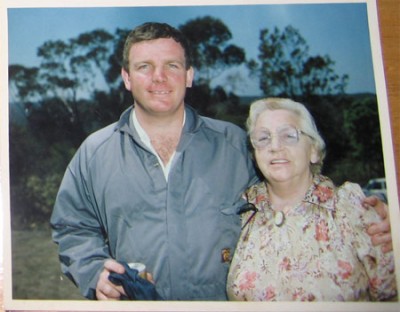
I’m passionate about railway heritage and was working on the restoration of a grand, old steam locomotive. A public celebration was held and I used to invite my mum to these kinds of [events]. The Railways would give my mum a huge bunch of flowers; she was like a queen. I've always remembered that because I thought it was payback for her.
I think Mum created, gave us, some self-confidence and expectation. My mum, I used to joke, always lived above her station. She carried herself with an expectation which, I think, rubbed off on us progressively. She had a difficult life [and] it was a struggle for her to try and keep us together as kids. I’m so grateful she lived long enough to enjoy seeing all of her boys do well.
Interviewed by:
Andrea Fernandes
NSW Migration Heritage Centre
14 November 2008
Visit the Fairbridge Heritage Project page for information on the CD-rom, The History Of The Fairbridge Settlement, Molong, by Ian “Smiley” Bayliff and David Hill and the publication, The Forgotten Children, by David Hill.



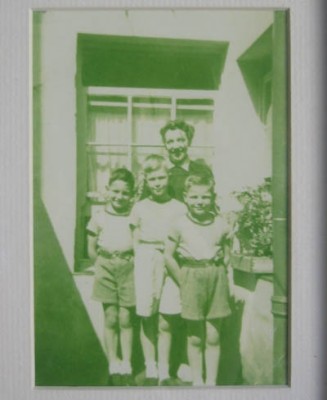
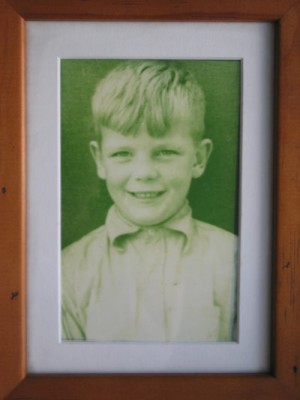
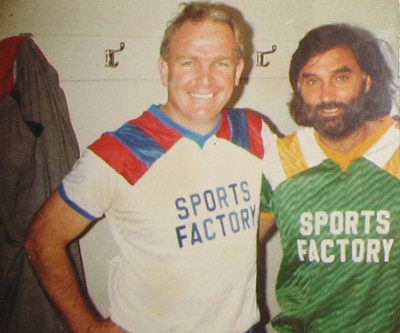
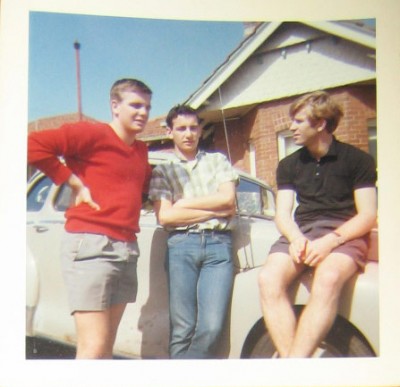
!["We wrote [at] every port. This is the first [correspondence] we sent after leaving England on our journey to Australia, a postcard of the SS Strathaird, this magnificent, old P&O liner. It's to Mum and [my eldest brother] Tony. We missed them like buggery. I was only 12."](../../../cms/wp-content/uploads/2009/11/postcard-150x150.jpg)
!["I didn't like the classroom at all, I had no connection with it. Those reports say I was boisterous and when I got to Australia it got worse. Most kids where I came from [are] unlikely to have had a decent education and most of them are still paying for it. There is nothing new about this and it still goes on today."](../../../cms/wp-content/uploads/2009/11/school-report-55-150x150.jpg)
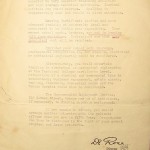
!["In English, I came 42 out of 45 in the class [with] 37% and failed. I got 16 out of 50 for spelling. Arithmetic – "needs to be pushed too much". Mathematics – "could do better". Biology – "more effort needed." Technical drawing, I came 20th out of 21."](../../../cms/wp-content/uploads/2009/11/school-report-60-150x150.jpg)
